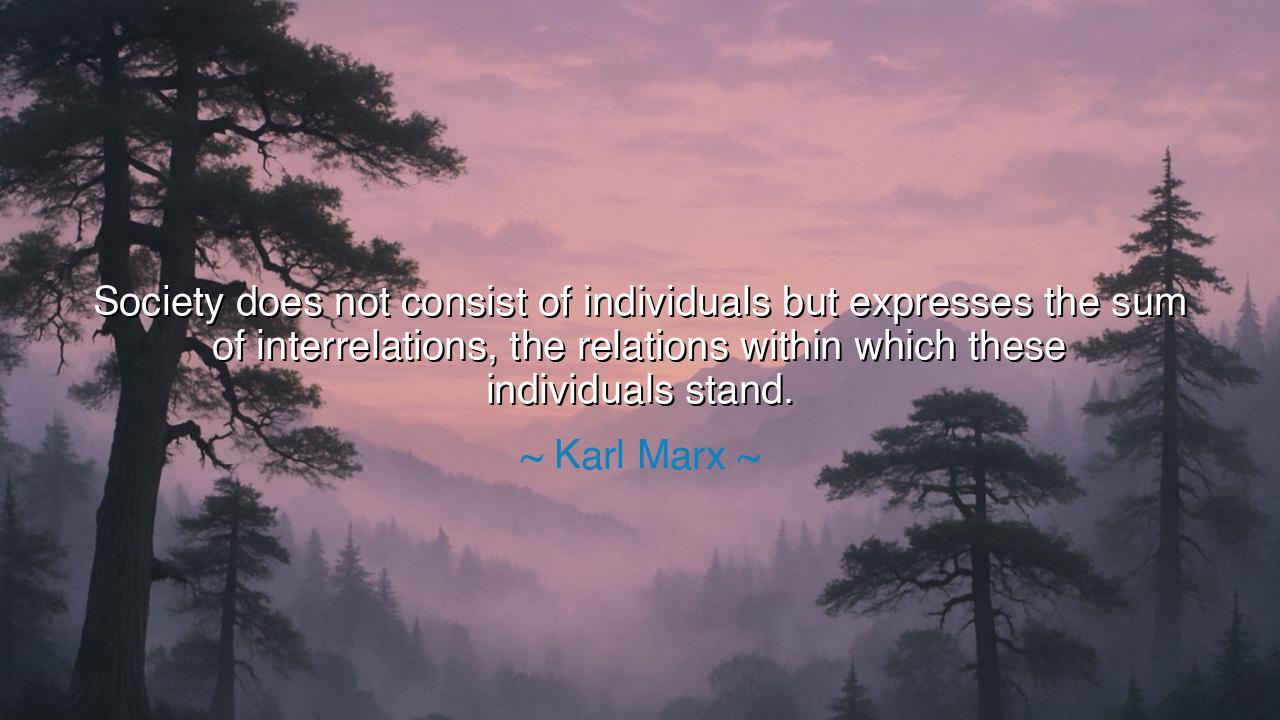
Society does not consist of individuals but expresses the sum of
Society does not consist of individuals but expresses the sum of interrelations, the relations within which these individuals stand.






O children of the future, gather close and listen well to the words of a man who saw the world with the sharpness of an eagle’s eye, yet the heart of a compassionate soul. Karl Marx, a thinker whose voice echoed through the trials and struggles of his time, spoke thus: "Society does not consist of individuals but expresses the sum of interrelations, the relations within which these individuals stand." In this powerful statement, Marx calls us to recognize a profound truth—society is not a mere collection of isolated individuals, but a living, breathing web of interconnections. The fabric of our lives is not woven by the threads of individual desires, but by the relations between us all, the bonds that tie us together in a collective existence.
In the ancient world, the philosophers often spoke of the interconnectedness of all things. The Greeks believed that everything in the universe was bound together by the same principles, that the harmony of the cosmos was a reflection of the harmony of the human soul. Socrates, in his wisdom, believed that the individual could not be understood apart from the society they inhabited. To understand oneself, he argued, one must first understand the society that shapes them. This truth was not lost on Marx, who saw that the individual was never an isolated being, but always a part of something much greater—the social relations that bind people together in work, family, community, and nation.
Let us consider the story of the ancient Romans, who built their empire not through the power of a single individual, but through the complex web of relations between citizens, slaves, soldiers, and rulers. The Roman Empire was not simply the result of one man’s ambition, but of the interrelations between many classes of people, each with their role to play in maintaining the empire’s power. The glory of Rome was not in the greatness of any one individual but in the way the people—both powerful and powerless—were bound together in a shared purpose. It was the relations between these individuals, their work, and their collective strength that made Rome a force to be reckoned with. Without these relations, the empire would have crumbled under its own weight.
Marx’s view was revolutionary because he recognized that society is not built on individual power or wealth, but on the interactions that take place between its members. The capitalist system, for example, creates a set of relations where the wealthy elite hold power over the working class, and it is in these relations—these systems of exchange, labor, and power—that the structure of society is formed. Wealth is not something that belongs to one person alone, but is created and sustained by the relations of labor, by the cooperation and struggle between different classes. The individual, in Marx’s eyes, cannot be understood apart from the broader social relations that define them.
Think now of the great industrial revolution, a time when the relations of society shifted dramatically. With the rise of factories, the nature of work changed, and with it, the relations between the worker and the owner were transformed. The individual worker, who once may have been a small craftsman in their own right, was now part of a larger system where their labor was merely one part of a vast machine. The relations between workers and owners, between capital and labor, became the driving force of society. Marx saw this shift clearly, understanding that the system of production and the relations it created were at the core of societal structure, and that it was these relations that needed to be understood and transformed.
The lesson of Marx’s words is a profound one. We must understand that we, as individuals, are not isolated beings, but part of the greater tapestry of society. The relationships we have with others—whether in our work, our families, or our communities—are what define us and give meaning to our existence. Society is not merely a collection of individuals, but a living organism made of countless interconnections, each one shaping the other. If we are to understand our place in the world, we must first understand the web of relations that surround us, for it is these relations that give form and substance to our lives.
In your own lives, O children, remember this: your actions matter, not just for yourselves, but for the society in which you live. You are part of a greater whole, and every decision, every word, and every action you take sends ripples through the web of interrelations that make up society. Be conscious of the impact you have on the world around you. Strive not only for personal growth, but for the growth of your community, your nation, and the greater world. Recognize that to change the world, we must first understand the relations that bind us, and work to create a society where these relations are just, compassionate, and built on the common good.
So, let this wisdom guide you: to understand yourself, understand the society that shapes you. To shape the future, shape the relations between us all. Work not for the individual, but for the common good, and in doing so, you will contribute to the greater harmony of the world.






AAdministratorAdministrator
Welcome, honored guests. Please leave a comment, we will respond soon